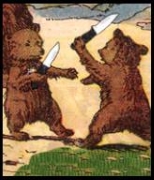Whybird posted:I would advise against using actual wargame rules for it -- getting into abstract boardgaming where you know the rules and stats and can know what's going on isn't conducive to a horror atmosphere. I think this is the best way to do so. In real life, the guys at the top of the food chain will typically having underlings who actually handle most of the crunchy stuff and are only expected to either handle the biggest overview of everything or personally intervene when intervention from the biggest guy on campus is actually necessary. For Call of Cthulhu, this means that most of the wargaming-style stuff can be abstracted or just ignored altogether under the assumption that people below them are handling it. The actual decisions they'll need to make will be more general, like "Do we focus on London, New York, or Berlin more when all three are being attacked at once?" or telling the research division "Switch from weapons to teleportation." Unless the administration of magical MI6 doesn't go very deep, they probably won't be the guys and girls pushing around little figures of tanks on a big map. Chances are they won't even be told about what's going on with battles until they're already over. And now speaking from experience working closely with the CEO of a company, there's a lot of stuff that just plain doesn't make it to the top. Even if the boss tries to be as hands-on as possible, there's innumerable matters of business and problems that rarely or never make it across their desk. Because of the leadership's position, only the most important things (that nobody else can handle by themselves, or that they're supposed to inform the leader of specifically) are brought up to them. How much they deal with is often related to their personality: an amicable guy who tries to take care of everything himself will find more and more things coming to his attention (and may find himself overwhelmed by the amount of decisions he's expected to make), while someone who's more curmudgeonly and gruff with their underlings may find that many issues are simply kept quiet from them as long as possible to keep them out of it. You can look at your PCs' personalities and determine just how that goes. And of course, there's always things that force them to get involved. Attacks on the base, infiltration, attempted coups...
|
|
|
|
|

|
| # ? May 10, 2024 18:18 |
|
How many of you use pictures while you GM? I'm running a game in-person right now and I've got a huge stockpile of cool fantasy pictures I'd love to start using, but the last thing I want to do is just keep pulling up pictures on my laptop and holding it up and going, "He/she looks like this" all the time. I'm looking for a more... let's say "natural" way to include them. Right now I haven't been doing so at all and just describing characters and places with words, but my players are the type who respond well to visual aids.
|
|
|
|
Harrow posted:How many of you use pictures while you GM? I don't do this, but you could make largish (4" x 4"?) printed-out standees, so they can be looking at upright portraits of the NPCs in the room. If they are phonehavers, you could also send them the pictures.
|
|
|
|
I use a decent amount of visual aids in my games. New NPCs and enemies get pictures because it makes the fights and interactions that much more memorable. I also hand out printed city maps whenever the PCs shows up in a new place. I even printed out a big world map so the PCs can reference where they are at any time. I don't go overboard with pictures. If it's a throwaway enemy or a minor NPC I don't bother.
|
|
|
|
Maybe select two images in advance of the session. The first one is "This time on" and the other being "Next time on". Use them for establishing mood, theme, setting up cliffhangers, etc.
|
|
|
|
Ulta posted:Maybe select two images in advance of the session. The first one is "This time on" and the other being "Next time on". Use them for establishing mood, theme, setting up cliffhangers, etc. Ooh, I like that idea. I already have "Previously on..." and "This time on..." things in my emails for scheduling the next session, so that'd be really easy to work in there. I like that idea a lot.
|
|
|
|
I've thought about it. In theory I have the perfect setup with a laptop and second screen. I could have pictures of major NPCs up while the party's talking to them, and impressions of the current locale while they're exploring. In practice I can never find pics that are just right.
|
|
|
|
My Lovely Horse posted:I've thought about it. In theory I have the perfect setup with a laptop and second screen. I could have pictures of major NPCs up while the party's talking to them, and impressions of the current locale while they're exploring. I suppose I could just hook up my desktop's monitor to my laptop and always display NPC pictures on it when they're interacting with NPCs (at least, NPCs that I have decent pictures for--might need to build up a stockpile of "generic bartender" or "some random guard" pics for consistency's sake) and maybe atmospheric environment pictures when they're dungeon crawling or whatever. It'd be kind of a pain to move my monitor back and forth, but it's only once a week, so that's not that bad.
|
|
|
|
So, in my nWoD Hunter/Shadowrun game I'm slowly leading my players to a job that will knock them out and the next session they will wake up in a locked room (barred from the inside) with a mystery monster somewhere else in the building. PCs will not be able to remember how they got there or know immediately that there is a threat. I'd like the session to be an investigation of how to escape this locked facility and/or kill the monster. Any tips for amnesia stories? PCs will remember who they are, just not know how they ended up in a locked facility
|
|
|
|
chitoryu12 posted:I think this is the best way to do so. In real life, the guys at the top of the food chain will typically having underlings who actually handle most of the crunchy stuff and are only expected to either handle the biggest overview of everything or personally intervene when intervention from the biggest guy on campus is actually necessary. Thanks for all the advice, y'all. The abstract route is definitely the way I'm going with it, I was only asking for strategic rules so I could abstract them down into their simplest parts anyhow. I like the idea of having a list of resources and hidden problems that they can discover or trigger. Also like the idea of them not necessarily knowing whats going on in each scenario until the outcome. The thing is, is there a good way of me arbitrating what happens in the sorta meta-campaign aside from my personal logic and GM fiat? Except when it doesnt make sense, for key moments I feel the need to have some kinda determining roll in there, I always like to leave things to the dice to keep things fair so its not just like "You guys had great success in this mission but you were doing entirely the wrong thing," the last session I did that a whole town got wiped out and the players only survived through ~reasons~. Inzombiac posted:So, in my nWoD Hunter/Shadowrun game I'm slowly leading my players to a job that will knock them out and the next session they will wake up in a locked room (barred from the inside) with a mystery monster somewhere else in the building. PCs will not be able to remember how they got there or know immediately that there is a threat. I mean the classic thing to do is have them find footage of bad or dramatic stuff happening to them that they don't remember or if they were unconscious or whatever then have them filmed in a state of vulnerability with the monster if you want to reveal it by then, bonus points if it was in the room with them when they woke up. Shadowrun has cybernetics right? Nick some limbs. Communist Thoughts fucked around with this message at 10:08 on Jun 6, 2015 |
|
|
|
I would say the best way of doing this is to let the players know the odds before they make a choice -- for example 'Your boffins reckon there is a 75% chance of the team achieving their primary objective, but only 60% if you order them to catch a Deep One alive for study.'
|
|
|
|
Whybird posted:I would say the best way of doing this is to let the players know the odds before they make a choice -- for example 'Your boffins reckon there is a 75% chance of the team achieving their primary objective, but only 60% if you order them to catch a Deep One alive for study.' I would avoid giving exact percentages, as it seems somewhat dry and odd when stated by a human being. "We stand a decent chance of achieving our primary objective, boss, but not nearly as good if you want us to get one of those fish people alive".
|
|
|
|
My Lovely Horse posted:In the background of the main quest there's an evil empire vs. revolutionaries thing going on I was planning to have a sidequest that involved one side hiring the party to distribute a large batch of elixir. It would be up to the party to decide which side. If they delivered the royal elixir, it would strengthen the public's trust in the king, while the other elixir would come with revolutionary pamphlets. Now, what if the revolutionaries' elixir was also a potent potion of strength that would directly give the people the power to take over an important bit of infrastructure? Going from that, what if the revolutionaries hired the party to go to a remote village and get the formula for this potion? Possibly from a druid. Possibly the village would be traditionally rebellious. 
|
|
|
|
Make the undead the tools of the good guys. Give them a much smaller capacity for intelligence but a semblance of self. Just enough to convey consent. Have farmers go undead do they can till the field forever for their families stuff like that.
|
|
|
|
Turtlicious posted:Make the undead the tools of the good guys. Give them a much smaller capacity for intelligence but a semblance of self. Just enough to convey consent. Have farmers go undead do they can till the field forever for their families stuff like that. Skeleton standing army. Zombies cleaning the sewers. Undead spit dogs turning the spits.
|
|
|
|
paradoxGentleman posted:I would avoid giving exact percentages, as it seems somewhat dry and odd when stated by a human being. I agree, it does feel kind of weird. The reason that I'd recommended it is so that you can roll for important outcomes without the players feeling like they're succeeding or failing on GM fiat.
|
|
|
|
Turtlicious posted:Make the undead the tools of the good guys. Give them a much smaller capacity for intelligence but a semblance of self. Just enough to convey consent. Have farmers go undead do they can till the field forever for their families stuff like that.  (And I'm pretty sure I'm even the only one who's read the Death Gate cycle.) (And I'm pretty sure I'm even the only one who's read the Death Gate cycle.)But that might be a potential outcome for the whole storyarc; after all, my most vocal player is all about compromise solutions.
|
|
|
|
I need some advice on what I imagine is a pretty common problem: dealing with a metagaming powergamer. You can probably skip reading this entirely, because I bet this is a really common issue: he loves to metagame, really seems to care only about combat, and is starting to be disruptive to the campaign's ability to be about something other than nonstop combat. How do you deal with issues like this when the person is a friend and you can't really threaten to ask them to leave the group because then you're the rear end in a top hat? In my current 13th Age campaign, the group is mostly new to this kind of system. We've played Dungeon World before (the first tabletop experience for most of my players), but some members of the group wanted to roll some d20s, so I proposed 13th Age and that's what we're rolling with. For the most part, they're slowly learning how things work in an initiative system with at-will, encounter, and daily powers, and several different types of defenses, and all of that. But then I have that one dude. I should point out all my players are friends of mine, so it's not like I don't like the dude. But as soon as I suggested 13th Age and he picked a class, he went crazy doing research to build the most mathematically perfect Sorcerer that he could. Then he started GMing his own 13th Age one-shots that are almost entirely combat-focused (which is fine and I've had fun playing in them); in doing so, he's memorized enemy stats. I've started renaming and re-statting every single enemy just to prevent him from being able to use his frighteningly encyclopedic bestiary knowledge. So now he's started trying to figure out enemies' AC and how much HP they have left and then announcing to the group the exact numbers as soon as he does. ("Aha, that means this guy has 17 AC!" "You just told me he's staggered, and we've done 45 damage so far, so that means he's probably got about 30-40 HP left!") It's not helping players' immersion. He also likes to remind people about how 13th Age suggests the GM balances encounters, and how many encounters per "day," so he likes to use that OOC knowledge to determine his in-battle tactics and then encourages everyone else to do so as well, no matter how many times I chime in that, well, the characters don't know that. He's not breaking the game or anything. It's just really difficult to keep everyone in character with him constantly making quips about trying to figure out what "the GM wants us to do" (the answer is almost never what he thinks it is) and constant OOC chatter about enemy stats and tactics, not to mention that his character's entire personality is that classic powergaming justification "my character just wants to be the ~most powerful~!" We all agreed going into this that we were going to try for a slightly more serious campaign than our previous one (which, by the end, was about as serious and focused as an episode of Family Guy, and about as frustrating to GM as it sounds). Maybe he read my desire for a more coherent story as "the GM has a set story in mind and we should just tell him what he wants to hear so we can keep it moving," which couldn't be farther from the truth. I've tried to communicate that, but I don't think he believes me, or maybe he doesn't care and just wants to get to the next combat as quickly as possible so that he can Gather Power-into-Lightning Fork the battlefield into oblivion.
|
|
|
|
Harrow posted:I need some advice on what I imagine is a pretty common problem: dealing with a metagaming powergamer. You can probably skip reading this entirely, because I bet this is a really common issue: he loves to metagame, really seems to care only about combat, and is starting to be disruptive to the campaign's ability to be about something other than nonstop combat. How do you deal with issues like this when the person is a friend and you can't really threaten to ask them to leave the group because then you're the rear end in a top hat? The only things under your control are: 1) how much you talk honestly about the issue 2) booting him because this isn't fun for you 3) quitting because this isn't fun for you 4) soldiering on because these are your friends and friends are supposed to commit to things they don't enjoy for each other, indefinitely Ask yourself whether you've really done all you can by talking to him. Have you said that 2 and 3 are things you've considered? If no, talk more and explain how it's really not fun for you to have him so laser-focused on combat and trumpeting what he's figured out. If yes, choose option 2 or 3.
|
|
|
|
Solicit some opinions on the question from your other players. If they're annoyed by his behaviour then the problem is big, and this includes you of course. I'd sit down and talk with him; ask him what he wants out of the game and tell him that his constant metagaming is making the game less fun for you. Talking to him, between two friends, is prolly the way to go. As for the whole "He rolled X so he must have Y skill" and poo poo like that. My players tend to do the same and I usually just let them, they enjoy figuring the encounter out and if I think an encounter is going poorly I'll change things up behind the scenes anyway.
|
|
|
|
homullus posted:The only things under your control are: I haven't made it clear that #2 and #3 are things that have crossed my mind, so the next time I talk to him I'll bring that up. Again, it's not that his behavior is ruining the game--part of my frustration is that I feel like I'm also not doing a very good job of GMing right now--but it is making it very difficult to run a campaign that involves more than "do the least amount of stuff possible to get to the next combat." My GMing confidence is pretty much at rock bottom these days, though. I've never had a group that I've had to work this hard to engage in roleplaying and my meta/powergaming friend is making it more difficult than it already is. SafetyTrain posted:Solicit some opinions on the question from your other players. If they're annoyed by his behaviour then the problem is big, and this includes you of course. I'd sit down and talk with him; ask him what he wants out of the game and tell him that his constant metagaming is making the game less fun for you. Talking to him, between two friends, is prolly the way to go. As for the whole "He rolled X so he must have Y skill" and poo poo like that. My players tend to do the same and I usually just let them, they enjoy figuring the encounter out and if I think an encounter is going poorly I'll change things up behind the scenes anyway. I'll do that, too. I've talked to other players about it in passing, but never seriously. I couldn't really figure out how to phrase it in such a way that it doesn't come off like I'm either badmouthing a mutual friend (not my intention), complaining uselessly, or just asking them to agree with me to shut me up.
|
|
|
|
I don't think you can ever really stop a player from "metagaming" or breaking down the mathematical framework of a game (that has one). The bad part that I see there is when he's sharing all of this information with the rest of the group, and moreover if he's playing backseat quarterback with everyone else's turns. I say talk to the group and ask them how they feel about it - do they think he's oversharing? The alternative is that the players actually like having to break down the tactical ramifications of a target's AC/PD/MD and their abilities and their own damage output etc etc in which case that's actually part-and-parcel of that whole mode of play.
|
|
|
|
Harrow posted:I haven't made it clear that #2 and #3 are things that have crossed my mind, so the next time I talk to him I'll bring that up. Again, it's not that his behavior is ruining the game--part of my frustration is that I feel like I'm also not doing a very good job of GMing right now--but it is making it very difficult to run a campaign that involves more than "do the least amount of stuff possible to get to the next combat." I'd bring it up straight, in a non-confrontational way. Something like "Hey guys, I've noticed that Problem Player does this a lot. Have you guys noticed that? How do you feel about it?". Also, it sounds a little like you might be experiencing some burnout. That's exactly how I feel when it hits me. Maybe take a break, ask some feedback from players after a while, and evaluate how your GMing is when you've had some time to disengage.
|
|
|
|
gradenko_2000 posted:I don't think you can ever really stop a player from "metagaming" or breaking down the mathematical framework of a game (that has one). The bad part that I see there is when he's sharing all of this information with the rest of the group, and moreover if he's playing backseat quarterback with everyone else's turns. Yeah, I don't have a problem with him knowing these things, and to be honest, I appreciate that he's one of the most proactive players at the table when it comes to solving issues, both in and out of combat. But just like you say, it's his constant chatter about it that's bugging me. Even more, what bothers me is his occasional comment about "doing what the GM wants us to do," because it undercuts the fact that, well, I plan my sessions without having something in mind that I "want" them to do. I mean, I want them to push the story forward, but it's up to them how they do that and what direction they do it in. I feel like he expects and/or believes that I'm going to just railroad them to one conclusion and I worry that he's convincing the other players of the same, even though I've said over and over again that I want them to do what their characters would do and that I don't have a "plot" in mind. Maybe I should show them the notes from a previous session so they can see that I really didn't plan for any particular path. I think I also made too intricate of a setting. Granted, it's just a collection of custom 13th Age icons with one or two paragraphs of description for each, but I think players might feel overwhelmed, like I'm expecting them to memorize all of the details. Part of me wants to pull the plug on this campaign and just do a straight-up, no-frills medieval fantasy adventure in a pretty standard fantasy RPG setting, but at least a couple of players seem pretty invested in their current characters, so I'm probably not going to do that quite yet. I do think I misread what my players wanted out of this campaign, though. SafetyTrain posted:Also, it sounds a little like you might be experiencing some burnout. That's exactly how I feel when it hits me. Maybe take a break, ask some feedback from players after a while, and evaluate how your GMing is when you've had some time to disengage. Yeah, I think you're right. I'm feeling pretty burnt out. The Dungeon World campaign we did before this kind of felt like a total disaster to me, and I think I'm carrying that feeling forward into this one. One of the other players has expressed interest in GMing his own campaign. Even if both campaigns are running at the same time, I think getting a chance to actually play for once instead of just GMing would help me with the burnout. Harrow fucked around with this message at 16:35 on Jun 8, 2015 |
|
|
|
If I wanted to run a Paranoia game, which core book is best? I see a lot of conflicting information online and I can't seperate the real stuff from Grognards spazzing out.
|
|
|
|
General consensus seems to be that either Paranoia XP or whatever the most recent one is is the best. It's unfortunate that there's not too much difference between them, you can't pull meaningful tricks on your players by telling them to each use a different version.
|
|
|
|
Also: Asking a player not to join your campaign doesn't have to be the social kick in the nuts you seem to think. Some people get very different things from roleplaying and if that's the case, the right thing to do is for them to play different games. Like, if I'm go out for curry every Wednesday night and one of my friends hates spicy food and spends the whole night complaining about how bad this tastes, it's ok to say to him 'dude, if you hate spicy food then stop coming for curry' Of course, if that Wednesday is his only opportunity to see you then hmm, maybe it's not just about the curry and you should arrange some other opportunities to hang out and play board games or whatever.
|
|
|
|
Dareon posted:General consensus seems to be that either Paranoia XP or whatever the most recent one is is the best. Really the only one to definitely avoid is 5th, but that's more because the fluff is bad and degenerates into 'HEY GUYS LOOK A POPULAR CULTURE REFERENCE' real quickly.
|
|
|
|
Minor setting/tone detail: pretty soon an NPC will approach my party with a request. A member of the local resistance got captured by the jackbooted militia and needs to be freed before they make him give up resistance secrets. The militia are oppressive hardasses, but I don't want to get all angsty and serious about their interrogation methods and start describing thumbscrews and broken people in the cells; at the same time I don't want to drift too far into the realm of the obviously absurd, like the old "make him listen to terrible music until he cracks" comedy standby. Is my best bet a ginger beer trick scenario with a room where militiamen take shifts just screaming and making mechanical noises until the prisoners' imagination gets the better of them?
|
|
|
|
My Lovely Horse posted:Minor setting/tone detail: pretty soon an NPC will approach my party with a request. A member of the local resistance got captured by the jackbooted militia and needs to be freed before they make him give up resistance secrets. The militia are oppressive hardasses, but I don't want to get all angsty and serious about their interrogation methods and start describing thumbscrews and broken people in the cells; at the same time I don't want to drift too far into the realm of the obviously absurd, like the old "make him listen to terrible music until he cracks" comedy standby. Is my best bet a ginger beer trick scenario with a room where militiamen take shifts just screaming and making mechanical noises until the prisoners' imagination gets the better of them? You could do unconventional, non-gory tortures, like Chinese water torture, or truth serum, or Enhanced Interrogation Techniques(tm): Waterboarding, sleep deprivation, or psychological poo poo.
|
|
|
|
My Lovely Horse posted:Is my best bet a ginger beer trick scenario with a room where militiamen take shifts just screaming and making mechanical noises until the prisoners' imagination gets the better of them? If you can think of a reason why the oppressive jackbooted militia thugs would be less than inclined to actually torture a guy, sure. Maybe one of their higher ups doesn't like it and (loudly) makes it clear that they'll be flogged if the prisoners are (physically) harmed? Or maybe the captured resistance member has a powerful family member who sees them in a patronizing "you'll grow out of it" light, so the militia can't hurt them too badly? Keeshhound fucked around with this message at 15:47 on Jun 12, 2015 |
|
|
|
The captured man comes from a good family with noble roots. He's part of the resistance but his station in life dictates that he be treated with a modicum of decency, even as a prisoner. However, the leader of the jackbooted militia is an impatient man so if the prisoner doesn't start talking soon he's going to end up in the deep cells where the torture happens.
|
|
|
|
Keep the Tories as non-descript as possible? Just steal the thing in the original Star Wars where Darth Vader comes in with that robot full of needles and then the door shuts? Or the one where there was some kind of hot table in that was also probably sharp? Make things look obviously dangerous, but don't describe stuff in detail and give your heroes a chance to intervene.
|
|
|
|
The 'torturer' is a psychic who drops people into elaborate dreams where they are tricked into revealing their innermost secrets. When the PCs arrive he already has the prisoner under, and they have to fight their way through his nightmare and defeat the torturer. Or if you want to be less fantastical about it: the sophisticated torturer got killed so for now they're just going with starving the prisoners until they talk.
|
|
|
|
Whybird posted:The 'torturer' is a psychic who drops people into elaborate dreams where they are tricked into revealing their innermost secrets. When the PCs arrive he already has the prisoner under, and they have to fight their way through his nightmare and defeat the torturer. Have the pcs kill the torturer. Have him be the first person they kill only its an accident. The torturer is out for a smoke break or a sandwich and the pcs just run into this dude wearing fancy clothes but also an apron absolutely covered in blood. Really just dripping blood everywhere.
|
|
|
|
Hey, I am about to start running a Hunter: The Vigil game and was wondering what sort of advice people here who ran the nWoD system have for me. Told my players that we would be making our characters for the first session. Kind of wanting to figure out how to bring them in, but don't want to really constrict them. They will be joining the Malleus Maleficarum conspiracy. Going to look into the quick start game and take what I can use for it for the first session and going to refer to the Block by Bloody book as they're going to try and save Chicago. Also be the first time really running a horror theme game any advice to bring in a tense atmosphere would be appreciated.
|
|
|
|
I ran a game of Don't Rest Your Head which was pretty fun. I relied a lot on withholding information and throwing the players into situations where they had to make hard choices fast and without really knowing the consequences. I'm far from any expert on horror but my advice would be to have familiar things be unsettling (the old trope of childrens singing in a haunted house for example) and limiting what information they have. This will make them uncomfortable and unsecure of what to do.
|
|
|
|
Ramba Ral posted:Hey, I am about to start running a Hunter: The Vigil game and was wondering what sort of advice people here who ran the nWoD system have for me. Pressure helps a lot. Scenarios where they have more problems than they can deal with and have to choose what gets solved and what gets shelved, a sense that they're getting less and less time to rest and recover between missions, and a constant, low level of harassment or horror from their enemies will help build tension and give the feeling of being nearly overwhelmed. The feeling that there's always another case waiting around the corner, always some fresh horror just when they think they've hit the bottom of it, will go a long way to promoting tension. It also helps to avoid fully explaining some of the mysteries they solve. Sure, they stop The Thing from devouring the homeless, but what the hell was that invisible fucker they exorcised in the attic? None of their contacts seem to know and it's only barely described in the dusty tome they used to send it back to Hell. Or wherever it came from. Every now and then, throw something at them that leaves them wondering 'Just what the fresh hell was that?'
|
|
|
|
A lot of what other people have said is true. Here's some more drive by advice: 1.) Show don't tell. I know people say that a lot but it's very true for horror. Don't just have a monster show up and wiggle its fangs at the player. Jump scares and gross-out don't work very well at the table; things that you think should sound scary will get a resounding 'meh' from players at the table. Instead build up the monsters (particularly in Hunter) by showing the players evidence of what the monster is capable of. If it's a mind-bendy horror from beyond show the human wreckage it leaves behind. Never just tell people the consequences. 2.) Horror as a genre relies on setting up the consequences and then following through. That's what separates it from urban fantasy. There's nothing wrong with urban fantasy and it's quite enjoyable. However, if you want to use horror for horror's sake then you need to deliver when you say something is going to happen. Horror is at its most potent when it leaves permanent, unalterable changes on the story or characters. Don't always do this unless everybody is on board; sometimes you need to run the game as urban fantasy or people will just get pissed at you. 3.) People fail a lot in nWoD. It's also a very lethal system. Don't rely on final confrontations with the monster every single time. As a change of pace it's nice but... even a fairly capable combat-oriented hunter will die when confronted with an equally combat focused supernatural target. Instead recognize that in horror the climax occurs when the tipping point has come and gone; when things have changed and there's no going back. It doesn't have to be a combat. Often times it comes down to an important choice the characters have to make. Focus on that. 4.) And of course, as always, never ever ever gate the plot behind an investigation check that the players must pass in order to proceed.
|
|
|
|

|
| # ? May 10, 2024 18:18 |
|
Anyone got any ideas for dramatic stuff I can introduce in the Monsterhearts game I might run tomorrow? In the first session I had a car crash into the PC's classroom, then there was a party that evening. I want to mix things up a bit more.
|
|
|



































